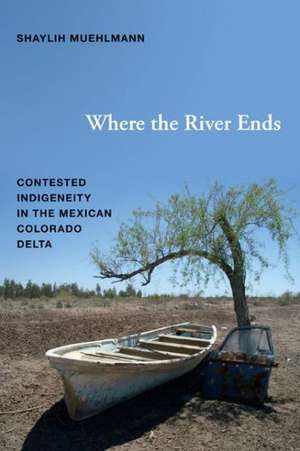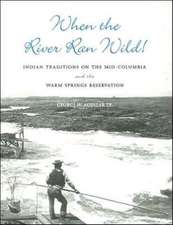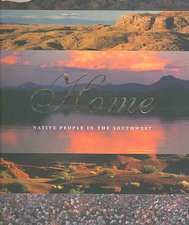Where the River Ends – Contested Indigeneity in the Mexican Colorado Delta
Autor Shaylih Muehlmannen Limba Engleză Hardback – 22 mai 2013
| Toate formatele și edițiile | Preț | Express |
|---|---|---|
| Paperback (1) | 238.39 lei 6-8 săpt. | |
| Duke University Press – 22 mai 2013 | 238.39 lei 6-8 săpt. | |
| Hardback (1) | 605.47 lei 6-8 săpt. | |
| MD – Duke University Press – 22 mai 2013 | 605.47 lei 6-8 săpt. |
Preț: 605.47 lei
Preț vechi: 747.50 lei
-19% Nou
Puncte Express: 908
Preț estimativ în valută:
115.86€ • 121.27$ • 96.43£
115.86€ • 121.27$ • 96.43£
Carte tipărită la comandă
Livrare economică 31 martie-14 aprilie
Preluare comenzi: 021 569.72.76
Specificații
ISBN-13: 9780822354437
ISBN-10: 0822354438
Pagini: 240
Ilustrații: 11 photographs, 1 map
Dimensiuni: 152 x 229 x 15 mm
Greutate: 0.49 kg
Ediția:New.
Editura: MD – Duke University Press
ISBN-10: 0822354438
Pagini: 240
Ilustrații: 11 photographs, 1 map
Dimensiuni: 152 x 229 x 15 mm
Greutate: 0.49 kg
Ediția:New.
Editura: MD – Duke University Press
Recenzii
"A vivid portrait of the double-bind that traps growing numbers of native people who are denied ancestral rights and legitimacy by outsiders' criteria for ethnic difference. In stories laced with humor and insight, this highly readable ethnography shows how identity coalesces in unexpected places as Cucapá cope with narcotrafficking, celebrate women's leadership in contrast to Mexican machismo, and cultivate expert vocabularies of indigenous swear words."Beth A. Conklin, Department of Anthropology, Vanderbilt University"Shaylih Muehlmann's richly peopled, intimate ethnography explores matters of identity and recognition, structure and agency, resistance and complicity as they emerge through the events, predicaments, and dilemmas of daily life. The characters at the center of her account are neither victims nor heroes, but reflective and often flawed subjects, engaged in struggles over resources, meanings, and the pragmatic business of survival. Where the River Ends leads us into their world. It is a lively read. Highly recommended."Tania Murray Li, author of The Will to Improve: Governmentality, Development, and the Practice of Politics
Cuprins
Illustrations and Maps ix
Acknowledgments xi
Introduction 1
1. "Listen for When Your Get There": Topologies of Invisibility on the Colorado River 25
2. The Fishing Conflict and the Making and Unmaking of Indigenous Authenticity 55
3. "What Else Can I Do with a Boat and No Nets?" Ideologies of Work and the Alternatives at Home 83
4. Mexican Machismo and a Woman's Worth 118
5. "Spread Your Ass Cheeks": And Other Things That Shouldn't Get Said in Indigenous Languages 146
Conclusions 171
Notes 181
References 189
Index 215
Acknowledgments xi
Introduction 1
1. "Listen for When Your Get There": Topologies of Invisibility on the Colorado River 25
2. The Fishing Conflict and the Making and Unmaking of Indigenous Authenticity 55
3. "What Else Can I Do with a Boat and No Nets?" Ideologies of Work and the Alternatives at Home 83
4. Mexican Machismo and a Woman's Worth 118
5. "Spread Your Ass Cheeks": And Other Things That Shouldn't Get Said in Indigenous Languages 146
Conclusions 171
Notes 181
References 189
Index 215
Notă biografică
Descriere
Where the River Ends is a moving look at how the Cucapá people have experienced and responded to the diversion of the Colorado River and the Mexican state's attempts to regulate the environmental crisis that followed.










